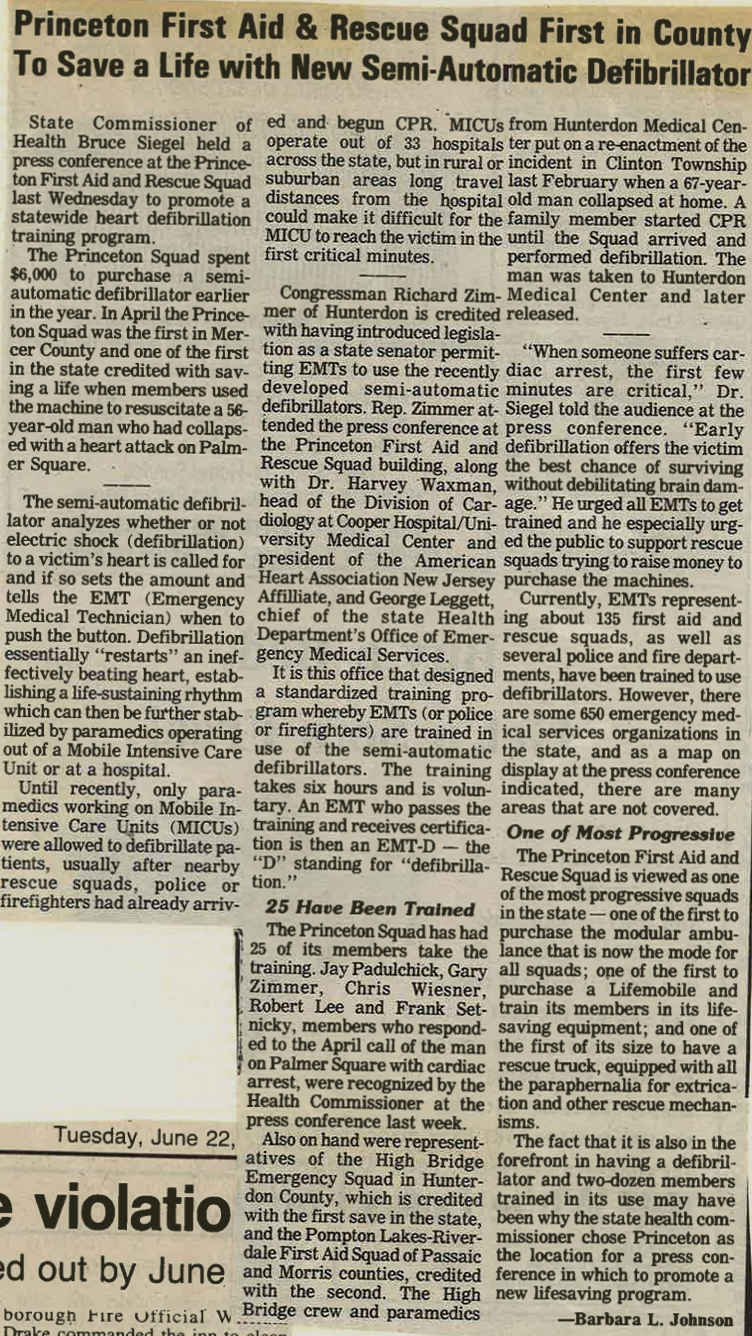
June 22, 1993 (~estimated)
Princeton First Aid & Rescue Squad First in County To Save a Life with New Semi-Automatic Defibrillator
State Commissioner of Health Bruce Siegel held a press conference at the Princeton First Aid and Rescue Squad last Wednesday to promote a statewide heart defibrillation training program.
The Princeton Squad spent $6,000 to purchase a semi-automatic defibrillator earlier in the year. In April the Princeton Squad was the first in Mercer County and one of the first in the state credited with saving a life when members used the machine to resuscitate a 56-year-old man who had collapsed with a heart attack on Palmer Square.
The semi-automatic defibrillator analyzes whether or not electric shock (defibrillation) to a victim’s heart is called for and if so sets the amount and tells the EMT (Emergency Medical Technician) when to push the button. Defibrillation essentially “restarts” an ineffectively beating heart, establishing a life-sustaining rhythm which can then be further stabilized by paramedics operating out of a Mobile Intensive Care Unit or at a hospital.
Until recently, only para-medics working on Mobile In-tensive Care Units (MICUs) were allowed to defibrillate patients, usually after nearby rescue squads, police or firefighters had already arrived and begun CPR. MICUs operate out of 33 hospitals. across the state, but in rural or suburban areas long travel distances from the hospital could make it difficult for the MICU to reach the victim in the t first critical minutes.
Congressman Richard Zimmer of Hunterdon is credited with having introduced legislation as a state senator permit-_ ting EMTs to use the recently developed semi-automatic defibrillators. Rep. Zimmer attended the press conference at the Princeton First Aid and Rescue Squad building, along with Dr. Harvey Waxman, head of the Division of Cardiology at Cooper Hospital/University Medical Center and president of the American Heart Association New Jersey Affilliate, and George Leggett, chief of the state Health Department’s Office of Emergency Medical Services.
It is this office that designed a standardized training program whereby EMTs (or police or firefighters) are trained in use of the semi-automatic defibrillators. The training takes six hours and is voluntary. An EMT who passes the training and receives certification is then an EMT-D — the “D” standing for “defibrillation.”
25 Have Been Trained
The Princeton Squad has had 25 of its members take the ‘ training. Jay Padulchick, Gary Zimmer, Chris Wiesner, Robert Lee and Frank Setnicky, members who responded to the April call of the man on Palmer Square with cardiac arrest, were recognized by the Health Commissioner at the press conference last week.
Also on hand were representatives of the High Bridge Emergency Squad in Hunterdon County, which is credited with the first save in the state, and the Pompton Lakes-Riverdale First Aid Squad of Passaic and Morris counties, credited with the second. The High Bridge crew and paramedics from Hunterdon Medical Center put on a re-enactment of the incident in Clinton Township last February when a 67-year-old man collapsed at home. A family member started CPR until the Squad arrived and performed defibrillation. The man was taken to Hunterdon Medical Center and later released.
“When someone suffers cardiac arrest, the first few minutes are critical,” Dr. Siegel told the audience at the press conference. “Early defibrillation offers the victim the best chance of surviving without debilitating brain damage.” He urged all EMTs to get trained and he especially urged the public to support rescue squads trying to raise money to purchase the machines
Currently, EMTs representing about 135 first aid and rescue squads, as well as several police and fire departments, have been trained to use defibrillators. However, there are some 650 emergency medical services organizations in the state, and as a map on display at the press conference indicated, there are many areas that are not covered.
One of Most Progressive
The Princeton First Aid and Rescue Squad is viewed as one of the most progressive squads in the state — one of the first to purchase the modular ambulance that is now the mode for all squads; one of the first to purchase a Lifemobile and train its members in its life-saving equipment; and one of the first of its size to have a rescue truck, equipped with all the paraphernalia for extrication and other rescue mechanisms.
The fact that it is also in the forefront in having a defibrillator and two-dozen members trained in its use may have been why the state health com-missioner chose Princeton as the location for a press conference in which to promote a new lifesaving program.
– Barbara L. Johnson